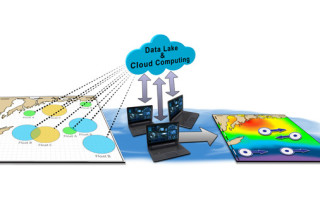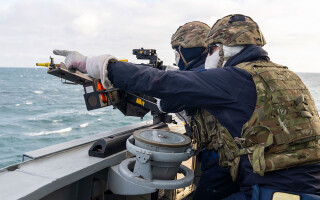DARPA promulgates vision of sensor-based "Ocean of Things"
NewsDecember 07, 2017

ARLINGTON, Va. The Defense Advanced Research Projects Agency (DARPA) has announced its "Ocean of Things" program, which the agency says seeks to enable persistent maritime situational awareness over large ocean areas by deploying thousands of small, low-cost floats that would form a distributed sensor network.
Each smart float, say DARPA officials, would contain a suite of commercially available sensors to collect environmental data -- including statistics on ocean temperature, sea state, and location -- as well as activity data about commercial vessels, aircraft, and even aquatic life moving through the area. The sensor data would be periodically transmitted via satellite to a cloud network for storage and real-time analysis.
"The goal of the program is to increase maritime awareness in a cost-effective way,” said John Waterston, program manager in DARPA’s Strategic Technology Office (STO). “It would be cost-prohibitive to use existing platforms to continuously monitor vast regions of the ocean. By coupling powerful analytical tools with commercial sensor technology, we plan to create floating sensor networks that significantly expand maritime awareness at a fraction of the cost of current approaches.”
The Ocean of Things faces two major technical challenges, according to the agency: float development and data analytics; DARPA has decided to open those two aspects of the project to proposers.
In the area of float development, DARPA's guidelines say that proposers must design an intelligent float to house a passive sensor suite that can survive in harsh maritime environments. Each float would report information from its surroundings for at least one year before safely scuttling itself in the deep ocean. Requirements for the floats: made of environmentally safe materials, pose no danger to vessels, and comply with all federal laws, regulations, and executive orders related to protection of marine life. The data-analytics portion of the Ocean of Things program will require proposers to develop cloud-based software and analytic techniques to process the data collected by the floats. These proposals will need to include dynamic display of float locations, health, and mission performance; processing of environmental data for oceanographic and meteorological models; algorithms to automatically detect, track, and identify nearby vessels; and identification of new indicators of maritime activity.
A Proposers Day is scheduled for January 4, 2018, at the DARPA Conference Center in Arlington, Virginia. Interested parties can obtain registration instructions and further details at https://go.usa.gov/xn552.





